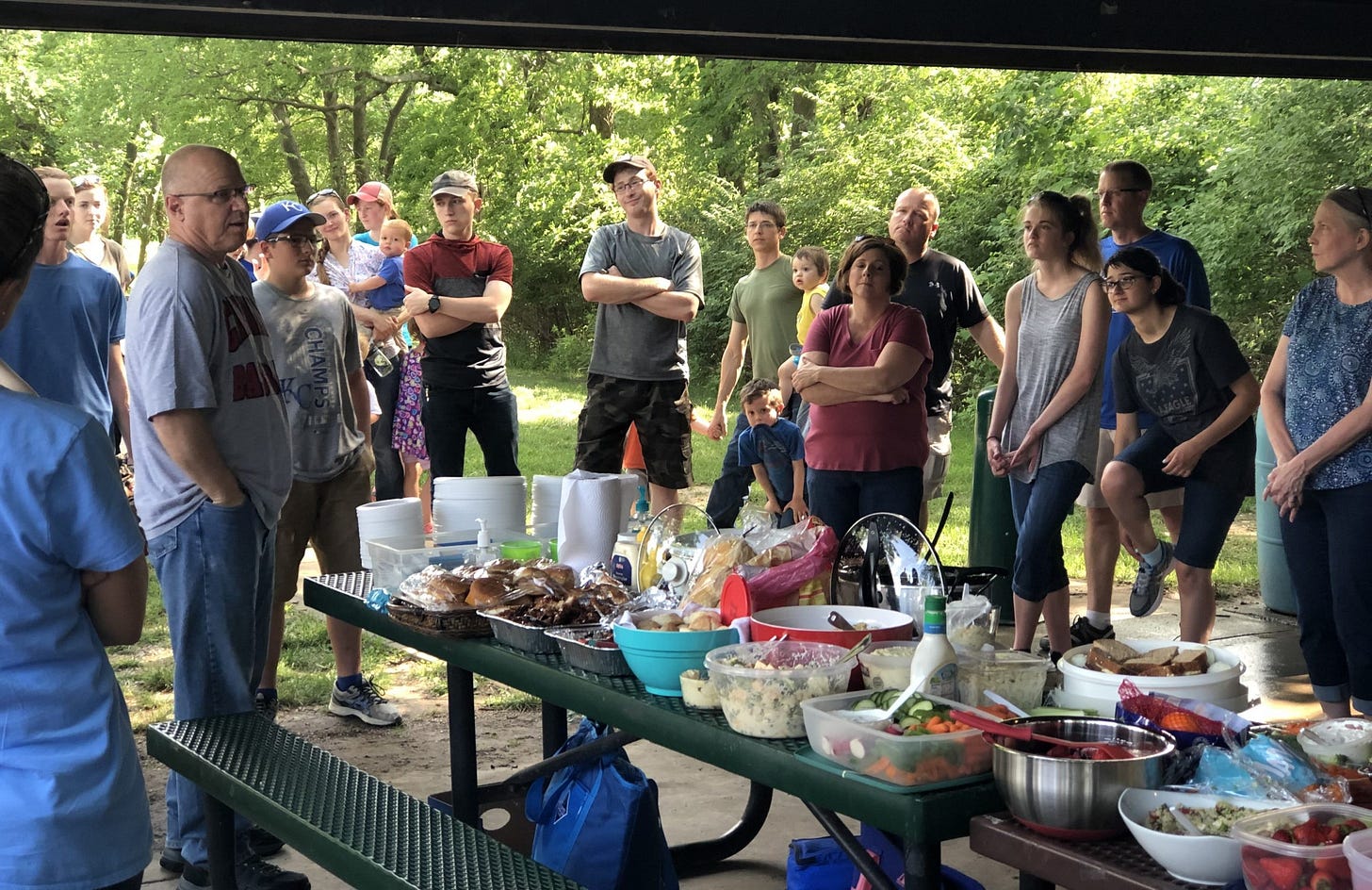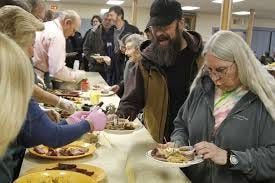A new installment of Journey of a New Christian. New to the series? This introduction provides an overview. An index of previous episodes is also provided.
I’ve never been a joiner. Whatever group I’m in, I usually find that I have less in common with any of them than they have with each other.
As a new Christian, I thought I would have more in common with fellow believers. This turned out not to be true. Apart from the faith we share now, we’ve had very different life trajectories. Many in the congregation grew up in the church and have known one another for decades. Many have lived all or most of their lives in this region, where my wife and I are relative newcomers.
Despite these differences in background, however, they have been incredibly welcoming. My wife and I have been going to the church for 8 years. In all that time I can’t think of anyone who hasn’t been friendly. Wherever we go, we’re accepted: Bible study, committees, fellowship dinners, picnics, and all kinds of other events.
This is not just true of our own church. I’ve felt the same welcome in several other Christian groups I’ve joined. One is a men’s Bible study held at the local high school. It meets once a week in the morning. Senior members who have been in the group many years take turns leading. I can’t go every week—when I have evening commitments, a 6 am meeting is just too exhausting. But when I do go I’m welcome, and I can tell people are pleased that I’m there.
Since I’ve been more open at work about my Christian commitment, I’ve been attending a Bible study there as well. It meets at an hour usually reserved for the Provost to meet with the deans, but when that meeting is canceled, I hike over to the math building and take the elevator to the third floor. It’s a small group—3 or 4 faculty, all from engineering and math, most of whom I’ve met only recently, but I don’t feel like an outsider.
The group is run democratically. No one leads. They’re working their way through Proverbs, one chapter at a time. Splitting up the verses among us, we read them aloud, discussing what they mean and sometimes how they apply to our own lives. The openness of this group is refreshing. As Dean, I oversee and give direction to faculty, but in Bible study I am just another believer trying to understand what God is commanding us through scripture.
When my wife and I initially talked to the Pastor about joining the church, I mentioned that we didn’t know other members all that well. His advice was to serve in the church. Working together shoulder to shoulder at common tasks is a surer way to build friendships than casual conversation. The overt purpose isn’t to get to know one another, but without realizing it you do.
It happened exactly that way when my wife and I joined the Care Team (deacons and deaconesses). We got to know the personalities of the other members: the jokes that amused them, where they went for holidays, who they prayed for and why. And they likewise got to know us. It wasn’t about life trajectories, what kind of work we did, or the families we came from. It was about what we learned from each other once a month in those Tuesday night meetings and at whatever other times we worked side by side at the modest duties the Care Team is charged with.
Enjoying fellowship with other Christians, I’ve found, does not satisfy all social longings. You find friends, good friends, who will minister to your needs if you share them and will share their needs if you show interest. But spending time with them is not like catching up with a college classmate whom you knew intimately a lifetime ago, or the next-door neighbor you chatted with daily when your children were playing together. Some of the people in the church have intimate connections like these, but they aren’t the aim or the result of Christian fellowship. Finding close friends when you’re older, and especially when children are out of the house, is as much a challenge inside the church as outside of it.
Christian fellowship is something quite different. It is intentional, not circumstantial. It isn’t the result of shared history or shared interests. It transcends education and social position. Its goal is not to bolster our worldly position or interests, but rather to strengthen faith through the mutual support of fellow believers. We may connect with them through worldly things, to be sure, but the aim is to strengthen each other as followers of Christ.
Because social position is irrelevant in God’s eyes, there is (or should be) an egalitarian strain in Christian fellowship. Some of the awkwardness I initially felt was due to the effort to connect with men who had worked with their hands all their lives and had little idea what my work, daily life, or leisure pursuits were like. I don’t know how to put a boat in the water, gut a deer, or change spark plugs on my car. Since I’m still working full time at 76, I don’t mow my own lawn or even own a lawnmower. Yet I work hard to make conversation with those who do some or all of these things, and they do likewise with me without detectable impatience. Whatever the gaps between our interests, capabilities, and life experiences, we are brothers in Christ.
The importance of this openness was driven home to me recently at coffee hour before Sunday service when I sat down with a woman whom I talk to sometimes about football. She has a disability and doesn’t interact with many other people in church. When I see her alone I come over and we catch up on teams we follow. Recently, after one such conversation, she asked where I worked. When I named the university, she replied, “Oh, are you the janitor?”
I was pleased that she assumed that. It meant I was learning to fit in with my brothers and sisters in Christ. I was even more pleased that I was able to tell her what I actually did without any embarrassment, either on her part or mine. This is a preview of what the kingdom of God will be like. We may have different roles, but we are all equally valuable. We do not look down on one another or take umbrage if people don’t know who we are.
Admittedly the preview is imperfect. God is working on us, but He’s not done yet. There are still occasional feelings of awkwardness, of social distance. Once in a great while people do get irritated, feelings are hurt, abrupt words are spoken. But we all know this is not how we’re supposed to treat one another. Amends are made—quickly. A smile and a kind word restore harmony.
Faith is fragile. People get distracted, become absorbed in worldly pursuits, become disillusioned, or fall away for some other reason. Christian fellowship encourages us, reminds us of our core commitment to Christ, and keeps alive the hope that accompanies it.
In this respect, Christian fellowship resembles service. As we work shoulder to shoulder on projects for the church, we are not always aware that there is another purpose to our efforts beyond the immediate tasks. We are being molded, strengthened for future struggles, and prepared for the kingdom. I have not been as quick as I should to serve in the church. In the next post I’ll describe how I’ve been gradually drawn into service and how I’ve found it rewarding.
If you’ve read this far, could you help spread the word with a “like”? (Click the heart!)







I’m chewing on “fellowship is an act of service.“ I had never thought of it that way (including the context.)
It gives hospitality among believers a new meaning. Thanks.
Charles, Last shall be First. You are the same as your brothers and sisters who knew our Lord before you. Those brothers include someone named Peter, John, and Paul. It is always the same grace and the same denarius from our Lord. By the way, the dean-janitor combination fits the description of a faithful servant.